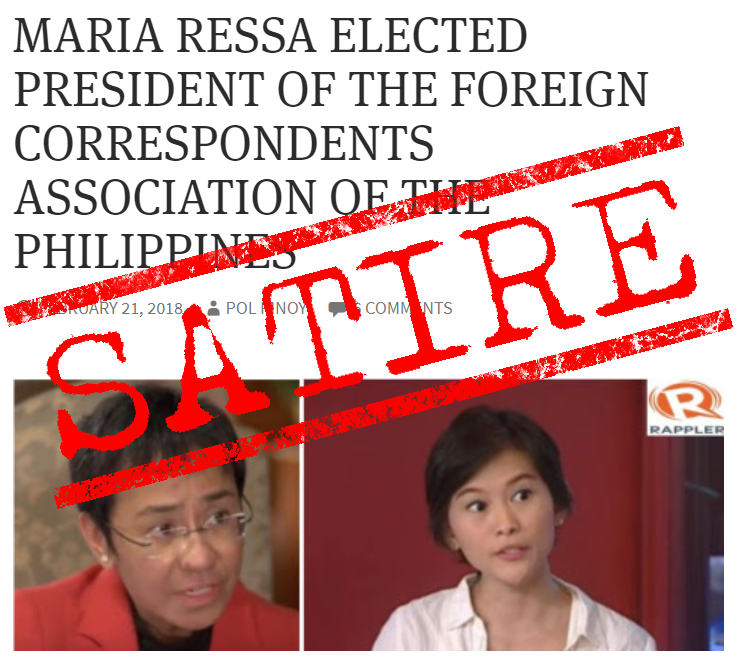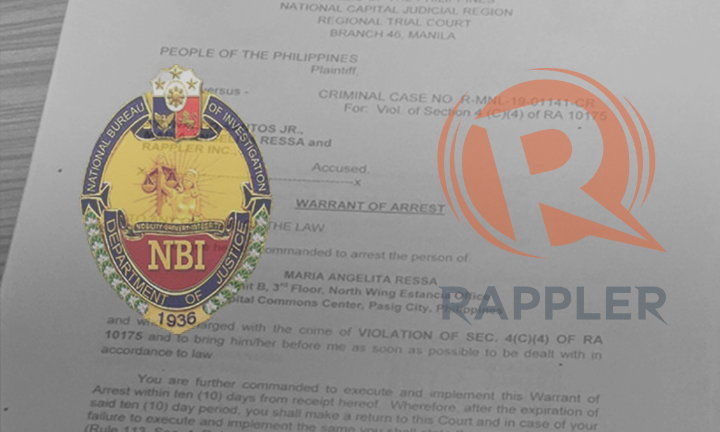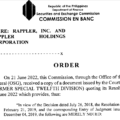A Manila court convicted Rappler chief executive officer and executive editor Maria Ressa and its former writer-researcher Reynaldo Santos Jr. for cyber libel and sentenced them to six months to six years in jail and fines of P400, 000 for moral and exemplary damages.
Manila Regional Trial Court Branch 46 Judge Rainelda Estacio-Montesa found Ressa and Santos guilty of cyber libel under Republic Act No. 10175, also known as the Cybercrime Prevention Act of 2012. In a 37-page decision issued on June 15, Montesa cleared Rappler, Inc. of any corporate liability to the charge.
The court said it found the article malicious, noting that Santos wrote it “sans verification as to the veracity of the allegations” that Filipino-Chinese businessman Wilfredo Keng was involved in “illegal activities such as human trafficking and drug smuggling” as supposedly written in an intelligence report.
“Rappler and both accused did not offer a scintilla of proof that they verified the imputations of various crimes in the disputed article upon the person of Keng apart from a sweeping and unexplained reference to a purported ‘intelligence report’ and a ‘2002 Philippine Star Report,” the judge said in a “final note” in the decision.
The court also noted that the defense did not present Santos and Ressa to “refute the charge against them.” It said Santos, being the writer of the article, “could have proven the veracity of the allegations he made” while Ressa would have explained her participation in its publication. The two would have been “both in the best position to testify that the article was published with good motives and for justifiable ends.”
The guilty verdict came amid calls from local and international media organizations, lawyers, and human rights groups to acquit Ressa as the issue smacks of stifling freedom of the press.
“The verdict against Maria Ressa highlights the ability of the Philippines’ abusive leader to manipulate the laws to go after critical, well-respected media voices whatever the ultimate cost to the country,” said Phil Robertson, deputy director for Asia of the Human Rights Watch. “The Rappler case will reverberate not just in the Philippines, but in many countries that long considered the country a robust environment for media freedom.”
The court addressed the press freedom issue raised by supporters of Rappler and Ressa, reminding them of the responsibility that goes with the exercise of the right to free speech and of the press.
The case rooted from the complaint of Keng in 2017 against a Rappler article originally published on May 29, 2012, which was re-published on Feb. 9, 2014 with a correction of a typographical error in the word “evasion” that previously appeared as “evation.”
The article written by Santos was titled “CJ Using SUVs of Controversial Businessman,” referring to then Supreme Court chief justice Renato Corona who was on trial for impeachment at the Senate. It quoted an undated “intelligence report” that detailed a purported “shady past” of Keng, the alleged registered owner of a Chevolet that Corona supposedly used.
Keng claimed that the article “contained malicious imputations of crimes.”
Under the Revised Penal Code, libel can be filed within one year since the publication of an article. Keng filed the cyber libel case after nearly three years since the story was republished in 2014, and five years after the 2012 publication. But the court ruled that the prescription period for cyber libel is within 12 years as it is “separate and distinct” from the ordinary libel under the RPC.
In a press conference right after the verdict was promulgated, Ressa’s lawyer Theodore Te said: “The judge imposed what we call an indeterminate sentence. It means that if the judgement becomes final then that is the sentence that will be served. The reason for the range is that the law gives the person, who is convicted, the eligibility to apply for parole upon satisfying the minimum of the sentence.”
The court granted the defense counsel’s plea for bail pending an appeal of the verdict which, Te said, “can change if we go up on an appeal because if we win the appeal then that can be overturned.”
Te added that he and his clients have 15 days to discuss their “legal steps forward” which could include filing a motion for reconsideration or an appeal to a higher court.
In the same press conference, Ressa appealed to the judiciary “to uphold the rule of law and maintain checks and balances.”
Ressa, who is celebrating her 35th year in the media industry next year, is facing seven more charges on trial, including tax evasion. According to a Rappler report, Ressa and some of her colleagues and Rappler are facing at least 11 complaints and cases as of Jan. 30. These cases started coming out in January 2017, barely six months after President Rodrigo Duterte “falsely claimed” in the 2017 State of the Nation Address that Rappler is “fully owned by Americans.”
“Next year will be my 35th year as a journalist. I began as a reporter in 1986 and I have worked in so many countries in the world. I’ve been shot at and threatened but never this kind of death by a thousand cuts,” she said, referring to criminal complaints filed against her.
Asked about the implications of the decision to press freedom in the country, she said it is “kind of getting” coronavirus disease-2019 (COVID-19) which the United Nations Human Rights Council claimed in its latest report, is being used by the Philippine government to go against critics.
“I think that’s what’s happening now. Our press freedom has already been rolled back because we are a cautionary tale. And that has an impact on our democracy. How well are we doing our jobs when we are personally attacked,” she said.
But Ressa said the fight is not yet over as she called for a “collective” action against the alleged suppression.
“This is like getting a disease. It doesn’t go away. And sometimes you’re weak or strong. But I think what we have to do is we collectively find a vaccine. And that’s what we’re gonna be working to do. We have to fight back and protect our rights. The constitutional rights guaranteed to us,” she said.




